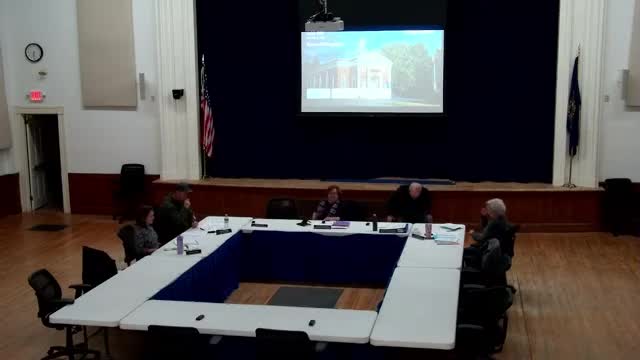Revision Energy presents landfill solar plan; Select Board declines to put lease authorization on warrant
Get AI-powered insights, summaries, and transcripts
Subscribe
Summary
Revision Energy updated the Kingston Select Board on a proposed landfill solar array and asked the board to place a warrant article authorizing lease negotiations on the upcoming town meeting ballot; the motion to place the article failed for lack of majority.
Revision Energy representatives updated the Kingston Select Board on a proposed solar array for the town landfill and asked the board to put a warrant article on the upcoming town meeting ballot to authorize the select board to negotiate a lease if a financeable design is identified.
Revision Energy representative Mark Zenkel told the board the firm’s design submitted to Unitil calls for a roughly 4 megawatt AC (just under 5 megawatt DC) array covering the portions of the capped landfill suitable for panels. Zenkel said the design would include “about 88,100 solar panels” if built as shown and that Revision has completed wetland surveys and an initial interconnection application and paid for the utility’s study. He said a supplemental Unitil study seeking a lower-cost interconnection option was still under way and expected to finish in mid-to-late February.
“Once we get the final interconnection study, assuming there is a size of system that we think we can build and finance, our next step would really be to begin the permitting process,” Zenkel said. He explained that solar on a capped landfill requires both an alteration-of-terrain permit and a solid-waste permit from the state Department of Environmental Services (DES). Zenkel said DES’s permitting for landfill solar is “rigorous” and that Revision would typically pay upward of $100,000 or more to complete engineering and permitting work.
Why it matters: Revision told the board it expects a lease payment floor of $35,000 a year to the town if the project moves ahead, and that owner-investors — not the town — would pay for any required utility interconnection upgrades. That revenue would alter the cost profile of the capped landfill, which currently produces no revenue and has ongoing municipal responsibility for the cap and liner.
Board members and members of the public pressed Revision on several risk and process points: who would pay to reconductor lines or upgrade the substation (Zenkel said the project owner or investor would pay any utility upgrades), how long DES permitting typically takes (Revision and its civil consultant Nobis estimated an 8–12 month state permitting timeline after design is ready), and the town’s exposure if a cap or liner were damaged. Revision said array owners would carry liability obligations in the lease and that the company and its engineering partners aim to avoid placing panels over areas with differential settling or known weak conditions.
A resident reading a letter from another resident and several board members flagged the timing as rushed: the deadline to submit warrant articles was immediately imminent, and several board members said they had not had adequate time to circulate the proposal to residents or review the proposed lease terms with the town attorney. One resident urged the board not to oblige the town without full documentation. Revision said it could provide a draft lease to the board the next day.
After discussion, a board member moved to place a warrant article on the ballot authorizing the select board to enter into a lease for up to 35 years for at least $35,000 in annual revenue. The motion specified that the select board would have authority, but not obligation, to negotiate terms. The board called the question. When members voted verbally, the chair declared the motion failed for lack of majority.
The board asked Revision to continue work and to provide regular updates for the public; several board members suggested a town-facing information page and monthly status reports to the board’s minutes and website. Revision said it would continue conversations with Unitil and investors and return after the follow-up interconnection study and additional design work.
Ending: The Select Board declined to put the authorization on this year’s warrant. Revision Energy remains engaged; the firm said the earliest realistic construction window would be 2026 given utility study timing, DES permitting and federal/state incentive timing.
